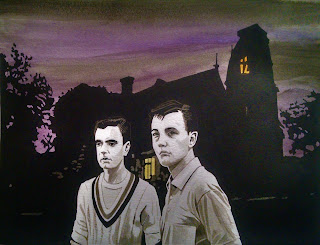.jpg)
GREAT DETECTIVES & PEOPLE OF MYSTERY #20 THE HARDY BOYS By the 1920s the literacy rate in America had climbed to over 90% and publishers began thinking about getting mystery readers at a younger age. Edward Stratemeyer, owner of the Stratemeyer Syndicate which was a book-packaging firm, introduced the Hardy Boys to a juvenile audience hungry for adventure. Frank and Joe Hardy were teenage brothers that comprised a trouble-shooting detective team. Frank was 16 and Joe was 15, and they lived in the fictional Northeastern town of Bayport on Barmet Bay with their father Detective Fenton Hardy, mother Laura, and aunt Gertrude. In the original stories the Boy's mysteries were often linked to their father's confidential cases. They were constantly involved in action and adventure but they "never lose their nerve...They are hardy boys, luckier and more clever than anyone around them." The quaint little town of Bayport becomes the location of murder, drug-dealing, r
.jpg)
.jpg)
.jpg)
.jpg)